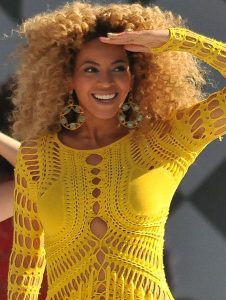Earlier this year, news reports indicated that American entertainment and music mogul Beyoncé Giselle Knowles-Carter had filed a trademark application at the U.S. Patent and Trademark Office to protect the use of the standard character mark BLUE IVY CARTER for a wide range of consumer goods. Beyoncé’s licensing business BGK Trademark Holdings is seeking to protect the mark, which is also the name of Beyoncé’s daughter with husband and rap star Jay Z, in a wide range of goods including an assortment of baby goods and cosmetics. BGK filed U.S. Trademark Serial No. 86883293 for BLUE IVY CARTER back on January 22nd, 2016.
On May 10th, 2017, entertainment and event planning firm Blue Ivy filed a notice of opposition to the trademark application filed by BGK Trademark Holdings. Founded in 2009, Blue Ivy has grown to serve New England, South Florida, Southern California and destination events across the world. According to the filed notice to opposition, Blue Ivy has earned industry acclaim including being recognized as one of the world’s Top 25 Wedding Planners by American media company Condé Nast. Blue Ivy and its founder, Veronica Morales, own U.S. Trademark Registration No. 4224833 covering the standard character mark BLUE IVY for event planning and management services.
Blue Ivy alleges that, although BGK Trademark Holdings is claiming the use of the BLUE IVY CARTER mark for a wide range of goods and services, that there’s no true intent to use the mark in commerce at all. Blue Ivy cites an October 2013 article published by Vanity Fair, after the first time BGK applied for the BLUE IVY CARTER mark, which quotes Jay Z as saying that the couple didn’t want to make any of the claimed goods but, rather, they wanted to prevent others from doing so:
“People wanted to make products based on our child’s name, and you don’t want anybody trying to benefit off your baby’s name. It wasn’t for us to do anything; as you see, we haven’t done anything.”
As a result, Blue Ivy is challenging BGK’s bona fide intent to use the BLUE IVY CARTER mark. In October 2012, CNN reported that Blue Ivy was successful in overturning the previous BLUE IVY CARTER mark filed by BGK. In addition to lack of bona fide intent to use and likelihood of confusion, Blue Ivy also alleges that BGK has committed fraud on the USPTO.
On June 19th, BGK Trademark Holdings filed an answer to the opposition and affirmative defenses, which admitted the publication of the Vanity Fair article while denying all allegations raised in the Blue Ivy notice of opposition. Among BGK’s affirmative defenses include opposer’s failure to state a claim, no likelihood of confusion as well as the doctrines of laches, estoppel, acquiescence and unclean hands.
BGK’s answer and affirmative defenses was filed more than a month after Blue Ivy filed a motion to take early limited discovery in the case. Filed on May 17th, the motion for early discovery sought leave to depose and obtain documents from Jonathan Schwartz, executive VP of BGK and signer of the ‘293 trademark application. Blue Ivy also requested a telephone conference with the judge, given the time-sensitive nature of the request. Convicted to a term of six years in prison for committing wire fraud and falsifying tax records, Schwartz will enter prison on July 11th. Blue Ivy sought early limited discovery related to Schwartz as Blue Ivy’s allegations of no bona fide intent to use and fraud on the USPTO are based on disparities between Schwartz’s written declaration on the trademark application and Jay Z’s comments in Vanity Fair. Specifically, Schwartz’s signed declaration personally verified an intent to use the mark in commerce, which conflicts with the Jay Z statement.
On June 6th, BGK Trademark Holdings filed a response in opposition of the motion to take early limited discovery. BGK argued that Blue Ivy did not attempt to consult BGK “in good faith” prior to filing the motion and that BGK has “neither the ability nor the responsibility” to produce Schwartz for a deposition because he is no longer affiliated with BGK. BGK also argued that there’s no reason that Schwartz couldn’t be deposed in the normal course of discovery and that “any purported urgency is of opposer’s own making.” “Opposer presumes – without any factual basis – that agents for Mr. Schwartz will not have access to his files during his incarceration,” BGK’s response reads.
On June 21st, however, an administrative trademark judge at the Trademark Trial and Appeal Board (TTAB) granted Blue Ivy’s motion for early discovery. The discovery is limited to the grounds of no bona fide intent and fraud on the USPTO.
It’s a little unclear why Beyoncé and Jay Z feel the need to squat on a trademark to prevent others from capitalizing on their daughter’s name. The USPTO’s website notes that, if someone attempts to register a trademark that includes a name, portrait or signature that reasonably could be perceived as identifying a particular living individual, that person would need written consent from the identified individual (or, presumably, consent from the parents) in order to register the mark.

![[IPWatchdog Logo]](https://ipwatchdog.com/wp-content/themes/IPWatchdog%20-%202023/assets/images/temp/logo-small@2x.png)


![[Advertisement]](https://ipwatchdog.com/wp-content/uploads/2024/04/Patent-Litigation-Masters-2024-sidebar-700x500-1.jpg)

![[Advertisement]](https://ipwatchdog.com/wp-content/uploads/2021/12/WEBINAR-336-x-280-px.png)
![[Advertisement]](https://ipwatchdog.com/wp-content/uploads/2021/12/2021-Patent-Practice-on-Demand-recorded-Feb-2021-336-x-280.jpg)
![[Advertisement]](https://ipwatchdog.com/wp-content/uploads/2021/12/Ad-4-The-Invent-Patent-System™.png)






Join the Discussion
One comment so far.
Night Writer
June 28, 2017 09:07 pmWow! Were there words with this story?